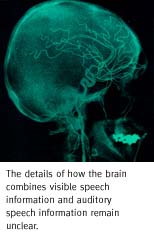

In an alternative theory, known as the motor theory of speech, speech is handled by a special part of the brain relying on different rules to process speech than are used by our other senses.
Whether or not a special part of the brain takes in spoken language is still open for debate, Massaro says. His work does not clarify where in the brain the visual and auditory speech information come together.
And his work doesn't clarify the nuts and bolts of how the brain processes speech information. Instead, it provides insight into the general rules used by the brain to work with speech. As Eve Clark, chair of the linguistics department at Stanford University points out, "What his findings say is that you combine information from all sorts of sources. But that in itself doesn't say how you're processing the different kinds of information."